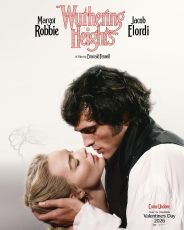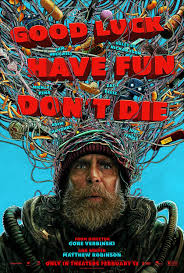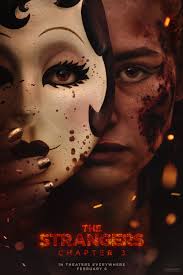
 Wuthering Heights Wuthering Heights
(Margot Robbie, Jacob Elordi, Hong Chau, Shazad Latif, Alison Oliver, et al / R / 2hr 16mins / Warner Bros.)
Overview: Tragedy strikes when Heathcliff falls in love with Catherine Earnshaw, a woman from a wealthy family in 18th-century England.
Verdict: This adaptation is a visually arresting film that unfortunately prioritizes style over the raw emotional depth of the source material. It is a good production in terms of technical craft but it fails to capture the true essence of the masterpiece by Emily BrontŽ. While it offers a striking cinematic experience it lacks the haunting psychological weight of the original novel.
Margot Robbie is stunning as Catherine Earnshaw. Her acting is the strongest element as she portrays a woman torn between social expectation and wild desire. However, her performance is hamstrung by a screenplay that feels weak.
The storytelling is fragmented trading gothic dread for marketable romance tropes and dialogue that feels out of place. It feels less like a faithful adaptation and more like a high budget music video. Purists will likely find it an empty reflection of the original work.
In short, itís all mood and gloom, but without the emotional backbone that makes the novel powerful. By the end, it felt heavy but strangely empty, like a storm with no thunder. [H.N.]
|
 Good Luck, Have Fun, Donít Die Good Luck, Have Fun, Donít Die
Sam Rockwell, Haley Lu Richardson, Michael PeŮa, Zazie Beetz, Juno Temple, et al / R / 2hr 14mins / Blaircliff Engtertainment)
Overview: A man claiming to be from the future takes the patrons of an iconic Los Angeles diner hostage in search of unlikely recruits in a quest to save the world.
Verdict: Director Gore Verbinski has a diverse oeuvre of films dating back almost thirty years. His work includes the first three Pirates of the Caribbean movies, the horror film THE RING (2002), the animated Oscar-winning RANGO (2011), THE LONE RANGER (2013), and the eerie A CURE FOR WELLNESS (2016). This is his first film in almost a decade. Itís written by Matthew Robinson (LOVE AND MONSTERS, 2020), and itís bonkers!
The patrons of late-night diner Normís in Los Angeles are interrupted by a rumpled man who claims to be the from the future (Oscar winner Sam Rockwell). His stated mission is to assemble a group of seven diners to help him save the world by stopping a young boy who is programming AI to destroy the world. If you donít believe him, he has a bomb strapped to his body ... are you paying attention now?
The man from the future claims heís been in this same diner more than 100 times and the mission has failed each time, yet heís back and this time his chosen team includes teachers Zazie Beetz and Michael Pena, Asim Chaudhry, grieving mother Juno Temple, and depressed Haley Lu Richardson who happens to be wearing a tattered princess costume.
Flashbacks are used to provide backstories on some of these characters, and mostly they face crazy and dangerous obstacles as they proceed through the night under future-manís leadership. Along the way, the film harps on our current obsession with smart phones and technology, while also acknowledging the overwhelming emotions of the political landscape. The dark comedy and frenetic action are a bit exhausting to watch, but the cast is so talented and loaded that we stick with it.
Verbinski delivers a film that is busy and chaotic fun, except when itís serious - then itís just busy and chaotic. Rockwell carries much of the film and his blend of energy, wisecracks, and sincerity are a perfect fit for someone looking to stop the AI apocalypse. You may or may not love the film, but itís doubtful anyone will label it as boring! [F.S.]
|
 Crime 101 Crime 101
(Chris Hemsworth, Mark Ruffalo, Barry Keoghan, Monica Barbaro,Corey Hawkins, Jennifer Jason Leigh, Nick Nolte, Halle Berry, et al / R / 2hr 19mins / Amazon MGM Studios)
Overview: Set against the sun-bleached grit of Los Angeles, Crime 101 weaves the tale of an elusive jewel thief (Chris Hemsworth) whose string of heists along the 101 freeway have mystified police. When he eyes the score of a lifetime, his path crosses that of a disillusioned insurance broker (Halle Berry) who is facing her own crossroads.
Verdict: So this film is not completely bad; first the good: The cast overall does a great job in carrying the water for this movie. Hemsworth and Berry do the heaviest lifting while Barbaro becomes that anchor for Hemsworthís character for what he desires. The visuals are good and the action seasons have lots of tension you can feel.
Now the bad; Ruffalo is just playing the same character, he feels robotic in this film. The back story behind Hemsworthís character is never really explored. There was also a lot of lazy writing and a complete waste of an actor like Nick Nolte, which you forget about halfway through the movie!
The ending is also completely disjointed and confused; things just happen. There is also all the normal Hollywood tropes which are look at evil rich vs all the homeless in LA. Also how men in business are misogynistic, however given what we know of Hollywood (Weinstine) maybe they are writing what they know. However, itís way over done and not even close to whatís it like in the real world.
This was a disappointing mainly due to lazy writing and a story that does not land; sorry! [T.C.]
|
 The Strangers: Chapter 3 The Strangers: Chapter 3
(Hannah Galway, Gabriel Basso, Ema Horvath, Richard Brake, et al / R / 1hr 31mins / LGF)
Overview: In the final film of The Strangers trilogy, Maya (Madelaine Petsch) faces the masked killers one last time in a brutal, full-circle reckoning of survival and revenge.
Verdict: The Strangers: Chapter 3 closed out the trilogy by picking up where the last two left off. And honestly, I only kept watching because I had faith in Madelaine Petsch, despite the films themselves giving me very little reason to.
This film is no different. Unfortunately, almost nothing here works. The writing is messy, the dialogue is rough, and every character (the Strangers included) feels completely detached. The whole thing is chaotic in the worst way, like it never quite knew what it wanted to be.
I stuck it out through the first two chapters hoping it would finally come together, but it just feels like wasted time. Hate to say it, but this trilogy is one I would not revisit again.
Overall, there are actual circumstances where our protagonist can actually escape but somehow fails due to annoying moments of plot convenience. OK, sure, as a conclusion itís fine. Not very satisfying but as much as it hurts to say, that was kind of expected. [M.R.]
|
 Shelter Shelter
(Jason Statham, Bodhi Rae Breathnach, Michael Shaeffer, Anna Crilly. Michael Mason, et al / R / 1hr 47mins / Black Bear Pictures)
Overview: On a remote coastal island, a reclusive man (Jason Statham) rescues a young girl (Bodhi Rae Breathnach) from a deadly storm, drawing them both into danger. Forced out of isolation, he must confront his turbulent past while protecting her, sending them on a tense journey of survival and redemption.
Verdict: The movieís main asset, obviously, is Statham. As always, heís cool, likable, and credible. Even if heís playing the same character that he always plays, his performance doesnít feel diminished or stale. If any other actor had been in his place, I wouldíve given this movie a 4-5/10. With Statham, though, I go for a 7.0/10.
The action scenes, which are plentiful, are fine. Some of them remind me of John Wick, particularly at the end. And thatís no flaw: I love the Wick movies.
A big part of the movie involves Stathamís relationship with the girl. And I think it works. Some of their scenes are heartwarming. The little girl looks adorable, and she never gets annoying (as many characters of her ilk often do).
I have a few gripes with the movie. The core plot with Statham and the little girl works, but the other main plot centers on the British government. Here, the scenes focus on a villain named Manaford and an ambiguous woman named Roberta. I found these government scenes to be slow and unsatisfying. The woman who plays Roberta is not a good actress.
The finale is completely by-the-numbers. Along the way, Statham and the little girl are pursued by some soldier. This soldier comes off like a Temu-Terminator in his behavior ... there are some corny and lazily written lines (You care about her?, one character asks Statham in a syrupy exchange). [M.R.]
|
 Send Help Send Help
(Rachel McAdams, Dylan OíBrien, Edyll Ismail, Dennis Haysbert, et al / R / 1hr 53mins / 20th Century Studios)
Overview: In Send Help, two colleagues become stranded on a deserted island, the only survivors of a plane crash. On the island, they must overcome past grievances and work together to survive, but ultimately, itís an unsettling, darkly humorous battle of wills and wits to make it out alive.
Verdict: Send Help is a survival horror with teeth and a scathing takedown of corporate power wrapped in a sun-soaked nightmare.
Send Help is proof, if there was ever any doubt, that Sam Raimi is fully back and having an absolute blast. This is horror dragged straight into the corporate world, then tossed onto a deserted island, shaken violently, and laughed at while it bleeds. The result is one of the most entertaining, uncomfortable, and surprisingly sharp survival thrillers in recent memory.
The setup is deceptively simple. Linda Liddle (Rachel McAdams) is the kind of employee every company exploits: loyal, brilliant, awkward, and invisible. She eats at her desk, often wearing the food by accident. She doesnít care about fashion or optics, just results. Her idea of heaven is going home to her pet bird Sweetie, watching Survivor, and sharing a piece of toast. She was promised a VP position by her former boss, only to watch it evaporate the moment his son takes over.
That son is Bradley Preston (Dylan OíBrien), a walking case study in corporate nepotism. Heís smug, entitled, casually misogynistic, and surrounds himself with college buddies while pushing out the people who actually keep the company running, especially women. When Linda confronts him about being passed over, Bradley insists she isnít ready, but offers her one last chance to prove herself: attend a company trip with him and the boys.
The plane crash that follows is brutal. Not metaphorically, brutal. Itís easily one of the most terrifying crash sequences put on screen since Final Destination. Itís chaotic, visceral, and relentless. Honestly? I donít know if Iíll ever get on a plane again after watching it!
From there, Send Help becomes something far more interesting than a standard survival story. Linda nurses an unconscious Bradley back to health, but the gratitude lasts about five seconds before he reverts to his usual behavior, condescending, dismissive, and entitled. Only this time, the world has shifted. The office hierarchy is gone. The island doesnít care about his last name.
What follows is a brilliant, slow-burn reversal of power dynamics. Linda discovers that in this stripped-down environment, where survival requires intelligence, adaptability, and actual work, she holds all the cards. McAdams plays this evolution flawlessly, letting confidence creep in gradually before tipping into something darker. Linda doesnít just enjoy the power shift she becomes obsessed with it. She revels in it. And thatís where the movie gets truly unsettling!
Dylan OíBrien deserves serious credit here though. Watching Bradley unravel as his authority evaporates is deeply satisfying and deeply uncomfortable. Heís no longer the predator; heís prey. Raimi milks every ounce of tension from their psychological tug-of-war, blending pitch-black comedy with mounting dread.
Then comes the third act-and this is Raimi in full mad-scientist mode. The horror ramps up fast and hard. The tone shifts. The laughs curdle. What began as a survival thriller becomes a twisted battle of wills, with moments that feel feral, cruel, and genuinely frightening. Raimi doesnít just raise the stakes; he lights them on fire!
Iíll keep this spoiler-free, but the final stretch is relentless. Youíre on the edge of your seat, constantly questioning who youíre rooting for ... and whether you should be rooting for anyone at all. A must see in theaters whilst you can aka the Big Screen, and possibly the best film of the month. [N.D.]
|
...Archives
|
|

